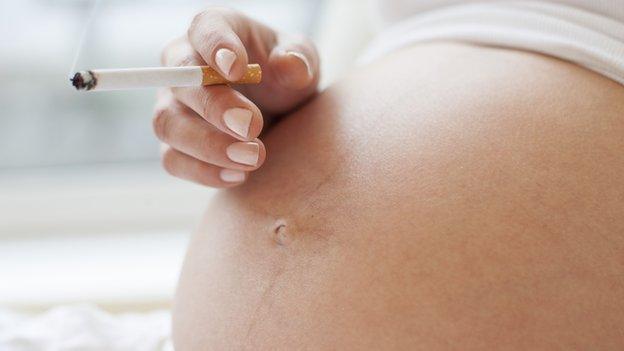Vouchers 'boost quit rates' in pregnant smokers
- Published

Offering shopping vouchers worth a total of £400 to pregnant smokers makes them more likely to quit the habit, say researchers.
They have published involving 600 women from Glasgow in the British Medical Journal.
More than 20% of the women offered vouchers stopped smoking, compared with 9% given normal NHS support alone.
The Royal College of Midwives said incentivising healthy behaviours using money was "not ideal" - and expensive.
Women taking part in the trial had breath tests - as well as providing saliva and urine samples - to check whether they were smoking. Blood samples were monitored too.
In the randomised controlled trial, the researchers assigned the women into two groups of around 300.
All were from the area covered by NHS Greater Glasgow and Clyde, which has large pockets of deprivation.
The control group were offered a face-to-face appointment with a smoking cessation adviser, as well as four follow-up phone calls and free nicotine replacement therapy for 10 weeks.
The financial incentive group received that standard support - as well as £50 in their first appointment, £50 if a breath test later suggested they had stopped smoking, and then a further £100 after another 12 weeks.
The final £200 voucher was given if another breath test at 34-38 weeks in pregnancy confirmed there was no carbon monoxide exhaled.
After a year, 15% of women who received the vouchers had managed to stay off cigarettes, compared with 4% in the control group.
The women used the vouchers at High Street stores such as Iceland, Argos and Mothercare.
'Bribery'
The researchers from Glasgow and Stirling universities say providing the vouchers is cost-effective for the NHS, because smoking in pregnancy raises the risk of miscarriage and stillbirth.
But schemes using financial incentives to promote healthy behaviour have been criticised as "bribery" - and this remains a controversial area of research.
The authors say in the BMJ: "This study provides substantial evidence of a promising and potentially cost-effective new intervention to add to health service support.
"Smoking during pregnancy remains a major health problem, resulting in the deaths of an estimated 5,000 foetuses and babies each year in the UK.
"It is responsible for tens of millions of pounds in extra healthcare spending.
"Receipt of financial incentives can contribute to needed household income in advance of the arrival of a baby in low-income households.
"Financial incentives to stop smoking could reach smokers who become pregnant before cigarettes have affected their health."
Statistics show 11.5% of pregnant women in England are smokers at the time of delivery.
The rates are higher in other parts of the UK, with almost 20% of women in Scotland reporting smoking at the time of their first ante-natal appointment.
Although rates have come down in recent years, pregnant women from unskilled occupational groups are five times more likely to smoke than professionals.
One of the lead authors, Prof David Tappin, said: "Many of these mothers have inadequate housing, difficult relationships, low self-esteem and only enough income to subsist.
"The money, albeit in the form of vouchers, often lifts the pressure.
"This evidence shows that the money is the hand they need to pull them out of their addiction.
"Women liked the four payments, particularly the last of £200 which allowed them to buy clothes for their coming baby and larger items like a pram.
"This trial was in one geographic area with a specialist pregnancy cessation service that was well developed.
"We want to examine this intervention in different parts of the UK where deprivation and smoking rates are different."
Janet Fyle of the Royal College of Midwives said education could encourage people to make healthy choices.
"Can we afford to incentivise behavioural change when the amount of potentially damaging lifestyle choices that people make could be almost limitless?
"What is also needed is a greater investment in prevention and in the health, educational and social care staff needed to promote the health and wellbeing of individuals."
- Published20 November 2014